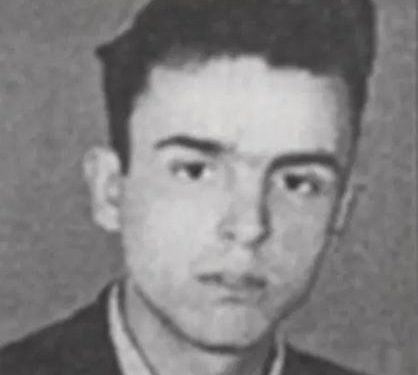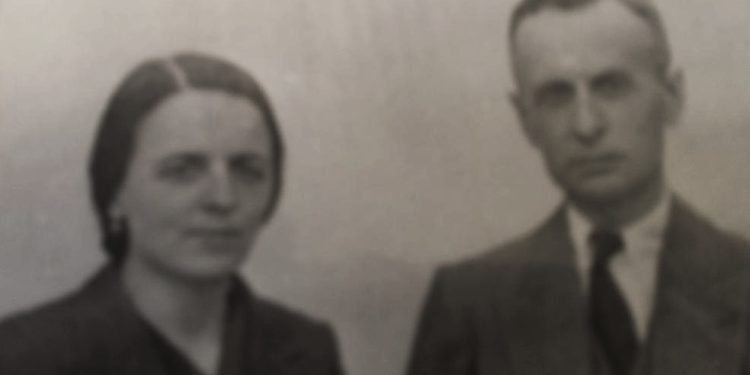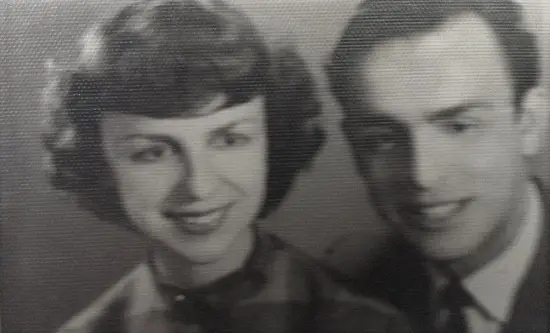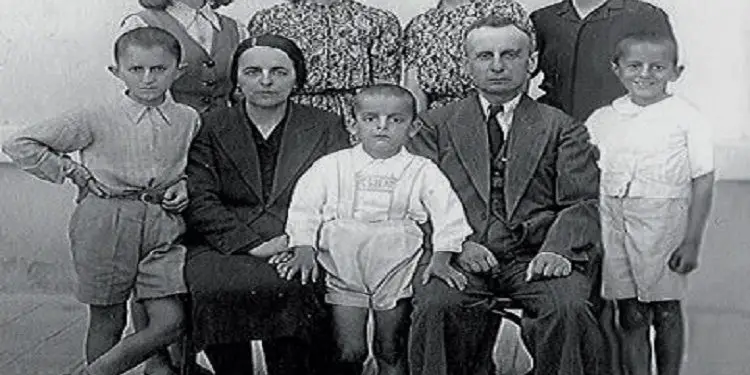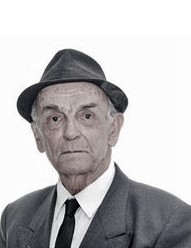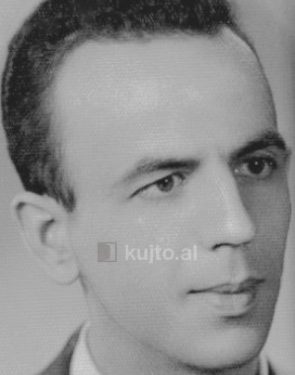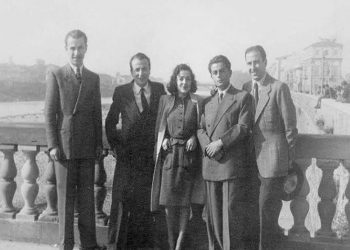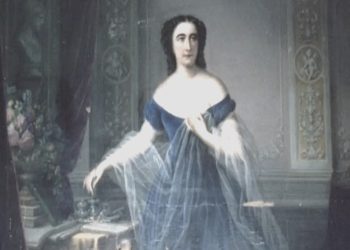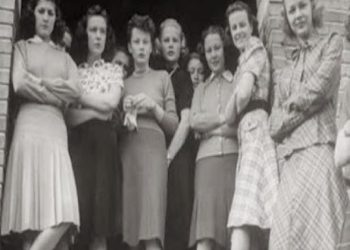By Reshat Kripa
Part fourteen
Memorie.al / “Sometimes, when difficult trials fall on a child’s head from the tenderest age in the secret recesses of his soul, a kind of scale is born, a beautiful scale, with which he weighs the affairs of this world . Feelings himself innocent, he submitted to his fate without making a sound. I didn’t cry at all. He who has no reason to be scolded, does not scold others”!
(Viktor Hugo, “The Man Who Laughs”)
SHORTED YOUTH
Dedicated to family and society,
Author
Continues from last issue
After a few months I received a letter from Vjollca.
Among others, it was written: “Everything came to an end.” You were right. I could not overcome the mountain that separated me from the Shining. Now I have to pay for the recklessness shown. As you must have realized, I am pregnant. He came back and pressured me to have an abortion. I cannot become the murderer of my child. We broke up. I loved with all the sincerity of my soul. I am proud of that.”
In these few lines, I recognized her character, a character similar to that of her father, whom I had known in prison. You said that before you didn’t have a daughter, but a mature man. However, it seemed to me that she was asking for my help and I had to give it to her. I decided to go to Korça again.
As soon as I got off the bus, I headed to their apartment. I knocked, but no answer. I knocked again and still no answer
– “Where have they gone at this hour”?! – I asked myself.
I knocked a third time, this time more forcefully, but again nothing. I started to leave, thinking. At the entrance to the palace, I met Robert with Eglantina.
– “Have you come yet?! Come in,” said Robert.
We entered the waiting room.
– “It’s been a week since they removed them,” Robert continued. – We don’t know where they went. A truck loaded the spoils. He was accompanied by an officer of the Internal Affairs Branch.”
– “The revenge of a delirious”, – I whispered, almost as if talking to myself.
– “Woe to him who can”, – Robert repeated the expression of the Roman general.
– “How do you drink coffee”? – Eglantina intervened to change the conversation
– “Worry”.
In fact, at that age, I didn’t drink coffee at all. At that moment it seemed to me that she would calm me down. I drank it almost at once and got up.
– “Where are you going? Stay with us tonight.”
“Thank you, but I have booked a hotel”.
I lied. I began to wander the empty streets of the city. It was eleven o’clock. I saw an open bar. I went in and ordered a double cognac. I drank it all at once and went back to the streets. I walked and whispered: “Class war! Class war”! These two terrible words repeated like a black omen in my mind. I had the impression that, after I was released from prison, I would no longer have the preoccupations there. But out here, it’s worse. Heavy discrimination, like the stone of Sisyphus on your shoulders.
I had walked like this for almost two hours. It was past midnight. A policeman on duty saw me and asked:
– “What are you looking for”?
– “Nothing, I’m going to the hotel.”
In fact, in front of me stands a three-story building, at the entrance of which, there was a sign that read “HOTEL”. I went inside. The receptionist had fallen asleep. I knocked and woke up.
– “Order friend”.
– “I want a bed”.
– “Letter notification”.
I gave it to him. Recorded the name in the register and then told me.
– “Second floor, room six”.
It was a room with two beds. Someone was sleeping in one of them. I lay down and thought. After some hours, I fell asleep. In the morning I got up early and left for Vlora.
Three weeks later, I received a letter from her. They had taken them to Thumana’s farm. They lived in a cow stable, which they had returned to their home. There were also other internees. I replied immediately. I tried to ease their pain a little.
Two months later, he informed me that he had given birth to a boy. In the letter you sent me, among other things, he wrote:
“I called it Memory. To remember the period when it came to life. I gave him my last name. He is only mine”!
I was overjoyed. I wrote him a letter, showing my congratulations. I promised that soon, I would go to visit them.
They don’t say for nothing, that the word takes the soil. That’s what happened in this case as well. It flew from Thumana and penetrated the stone walls of the prison of Tirana, where Sadiku was. The news had been transformed and taken on other dimensions. This had worried the poor father and he wrote to me, as the closest person:
“I am very shocked. My daughter has given birth to a child. How is that possible?! Please, I only trust you, that you will tell me the truth. Write to me and don’t leave me in this dilemma”.
I decided to go to Thumana. I took the bus to Rrogozhinë. From there to Vora, I went by train. A truck took me to Thumana. They lived some hours away from the center. I did this route with zeal.
They were overjoyed when they saw me. The boy was healthy and beautiful. She looked like her mother. He hardly cried at all. His voice was heard only when he was hungry. He breastfed and rested again. The stable where they lived was long. It was divided into six entrances, with two rooms each.
That night we stayed up late, talking. Vjollca told me that a thirty-five-year-old man from Korça lived next door. He was a senior economist. He worked there as a laborer. They had exiled him, after his father had escaped. His mother had died, only two months after the exile. He had been married, but his wife had separated him, since she did not have children. His name was Kristaq Gjoka. You had proposed marriage. So far, she had not responded. He could not decide. He also asked for my opinion.
– “From what you tell me, it seems like a good opportunity. – I told. – Ask your heart and decide. The boy needs a father. I gave it.”
At this time there was a knock at the door. Vjollca opened it and Kristaqi entered the room. We met each other. She had told him about me. So we started talking, as if we had known each other for a long time. He was a loving and talkative person. Quite candid in conversation. He openly expressed his feelings to me.
– “I want her word. I have given mine.”
I looked at Violet. Her eyes were shining, from two tears that began to flow down her cheeks. I realized that I had the last word. I took their hands, joined them and said:
– “Let me be your godfather. Be happy and God be with you”!
They hugged. My mother, sitting nearby, starts to cry with joy. Even in hell, there are moments of pleasure. Such was this today. The boy slept like a lamb in his bed. I watched with pleasure, the joy of this family. They joined their two entrances, just as they had joined their hearts. They did not have a wedding. They got married the next day that evening. I, although young, played the role of Hoxha or priest in this ceremony. I didn’t say anything about the letter my father sent me.
When I returned to Vlora, I wrote to Sadik:
“Sleep tight! You have a daughter, pure as crystal. Violet has found her destiny. You will see and prove me right. Congratulations for the boy”!
After a few days, Vjollca with Kristaq and the boy went to meet Sadik. He was very pleased, especially with the little grandson, who was like an angel descended from heaven. His sweet smile made the worried grandfather happy.
VICES OF LIFE
After seven months of wandering up and down, I was able to start working at the Salt Company. I worked in the production tubs, near the village of Nartë. Together with me, Klitua also worked with Muharrem Shehu, from Karbunara e Lushnje. I had his cousin, Tajfur, in the camp in Bulqiza.
The work was individual. Each had a row of tubs. It started at six o’clock, with the release of water to fill it up to the specified level. Then the salt extracted the day before had to be transported by handcart, over a distance, to the place where the decovil took it. You would rest until the afternoon, until the salt precipitated at the bottom of the tub. At the end, it was taken out with a side lash. In short, you would be there for about twelve hours. This for a salary of only seventy old ALL per day, as well as bread, food and clothing.
The tubs were in the eye of the July sun. The heat was unbearable. To pass the extended hours of the lunch break, we had built a tent, covered with ferns. Returning home to rest in the heat was impossible as it was about an hour away. At break time, we told different stories. The most orator in this direction was Klitua. He told us all sorts of things. A subtle humor permeated his stories.
Muharrem was telling us the story of his life. He was in love with Polixenes. Her brother worked in the editorial office of the “Voice of the People” newspaper. For this reason, her family opposed this relationship. He was forced to kidnap her. She left her family for the sake of love. Later, a serious illness laid him to bed. It remained paralyzed. He did not share. He served him like a child. His sacrifice rewarded the sacrifice she had made before.
At the end of the first fortnight, I received my salary. In total, 950 old ALL. I handed it all over to my father. Although the amount was small, I was happy that I was finally contributing to the family budget. My father gave me back one hundred ALL, saying:
– “Keep these to destroy them, wherever you want”.
That was the possible limit of my expenses, for fifteen days. These were family opportunities. With them I could rent Veliu, or any other friend, with anything, pay for cinema tickets, or buy a book.
In September, with the beginning of the rainy season, we were fired. I took the queue of the unemployed again. I had to go back to the Employment Office to find another company.
Two months later, I started working at the “Vlora” Agricultural Enterprise, or “Ullishte”, as it was called in the vernacular. The work was hard and the pay low. Initially, we worked on carpets, for the opening of new lands. With the onset of winter, we moved on to the olive harvest. We, the men, shook them, while the women gathered them. In the evening, we lifted them by the side and drove them to the brigade headquarters, where they were weighed and the achieved rate was calculated. The biggest difficulty was when it rained. We were forced to sit under the trunk of a large olive tree. The mud did not leave us, for the whole winter season.
Brigadier, we had an ignoramus from Vërmiku. It was a type of capadaiu, one of those we often encounter in our country. It was the best representative of those who implemented the class struggle point by point. We, who had a mark in the biography, as it was said then, treated us as enemies. Whenever there was a brigade meeting, he would say:
– “Those who don’t have front lines, leave.”
We were not allowed to attend the meeting. Of course, according to their logic, not to listen to the “big secrets” that would be discussed, in an agricultural brigade! In addition to me, this group included others from my category, such as the sisters Liri, Hava and Liza Ndreu, from Dibra, as well as Dava and Lek Mëlyshi, from Mirdita, who were interned in Vlora, as their son and brother , Pal Mëlyshi, had allegedly joined the saboteurs. It was a game of State Security. After Paul’s murder, he was declared “Hero of the People”. They came and received the family with great honors. So in the midst of these difficulties, I continued until the month of April.
A family friend convinced the chairman of the Cooperative of Woodworkers, Sefer Daut, to hire me. Seferi was a wood engineer. He had finished his studies in Prague. He was a perfect man. He hated intrigue, gossip, servility. He knew our family well. The parents had been friends. A few years later, thanks to his manly character and honesty, he would end up in prison, sentenced to ten years. With the democratic changes, we would become close friends. This friendship continued until he closed his eyes.
With the mediation of Sefer, I was appointed as a worker in the company’s carpentry. The work was not very difficult. In addition, it was work inside, where neither the rain, nor the cold or the heat. I also started to learn master carpentry. This did not last long. One day, the chief of staff, Shameti, from Tërbaçi, entered the department. He saw me and ordered me to be removed. In the enterprise, the word of the chief of staff was stronger than that of the chairman. It was the paradox of time. I was transferred to transport lime with “Skoda”, from Llogoraja, to Vlora.
The shop where we unloaded the lime was in an alley in the “Muradie” neighborhood. Nearby was the house of Aliqi, my classmate. The narrow place when we unloaded, caused us to be covered with lime, so much so that we were unrecognizable. I was worried that she wouldn’t come out and see me in that state, but luckily at that time, she was at the university in Tirana. One day, while we finished unloading and were getting ready to take a shower and go home, Shameti comes with Sefer. The first spoke in a commanding tone:
– “Now you will go to load a road of boards, at the sawmill agency”.
It was almost four o’clock, the time at which the working hours ended. The workers began to protest. Going there meant continuing work for almost two more hours. I also joined them. Sefer came closer and stepping on my foot, he said in a low voice:
– “You keep quiet”! – And winked at me, nodding towards Shamet.
I understood everything. My opposition could be interpreted as a deliberate incitement of the workers. My rebellious spirit urged me to protest, but reason restrained me. Silence. I had no right to raise my voice even when I was wronged. However, the warning that Seferi gave me, I considered as a great honor, because it was not known, where I could end up!
After finishing the lime, I moved to brick production, in the “Lirim” neighborhood. There were four of us. Among us, there was a little girl who had just turned fifteen. He continued high school, but he had started working, to help the family as little as possible, for the two summer months. It was Ana Muço, the daughter of Skënder Muço, a well-known lawyer, exponent of the “National Front”, killed by the Germans in 1944. She worked with her head down without making a sound. She carried the bricks with her little hands, without complaining whether she was tired or not. I was sorry. I reminded myself that life’s vicissitudes began at her age. I asked myself:
– “Why did this girl suffer like this?! Why should he pay for his father’s beliefs”?
It was the fatality of this nation that had predetermined its destiny.
Memoir
THE UNSINGABLE SONGS
At the end of August 1956, I went to enroll in evening school. Professor Harilla, was dismissed as director. The new director, Pullumb Çeli, asked me for the certificate of release from the seven-year school. I told him that they had it there, since I had stopped the first class, since 1951. He drove me around for several months, without accepting me. Sometimes he said that the receipt was not found and sometimes he invented something else. I realized that the main motive was my prison. So that year, I stayed without going to school.
In October there were riots in Hungary. The Hungarian revolution raised hopes in us as well. But everything faded quickly. The intervention of the Soviet troops covered the streets of Budapest with blood. These events inspired me to write something.
It was a story, about thirty notebook pages, handwritten. At its center, there were two young people who fell in love, Giula and Klara. They were connected to the Student Movement. At the time of the revolution, they threw it away. After suppressing him, he is shot, while she is sentenced to ten years in prison. After being released in memory of her lover, she remains unmarried for the rest of her life. As the title of the story, was the famous expression of Petëfi; “For love I give my life, for freedom, I give love”.
I told the story only to Fatusha. She liked it very much. He ordered me to keep it in a secret place, so that it would not fall into the hands of the Security, in case the house was raided. At that time, anything could happen. I placed it at the bottom of a box of old, half-torn books that I kept as precious heirlooms.
In May 1957, I wrote another short story, which I sent for publication in the newspaper “Voice of Youth”. I had posted the event in the past of the country. It described the suffering of a mother, facing her only sick son who was dying and was unable to help him. I titled the story; “A mother’s worries”. After two weeks, I received the newspaper’s reply. My story could not be published because, according to them, its heroes were weak and weak people.
At the beginning of August, the former director of the high school, Harilla Koçuli, told me, coincidentally, that I had to write a letter to the Minister of Education, to admit me to the school. I wrote it and started the letter. The response was delayed for almost two months. My request was approved. I showed up at school. They registered me and I started the lessons. It was the beginning of October.
It was the only pleasure of that moment. School was my dream. It was clear to me that my step there would be until the end of high school. Above, the doors would be closed. However, I decided to dedicate myself to it. I had to be the first in the class and possibly the best in the school. Sedra constantly teased me about this. Thus I was able to win the sympathy of most of the teachers and students of the class.
First day of school. Math class. Teacher Bubulina Arapi, I order to extract from a paper. We would do a written exam. He wrote three exercises on the blackboard and said to start. They were related to the chapter on factorizations, the square of the sum and difference of a binomial, and the difference of its squares.
From what I remembered from the first class I had taught six years ago, they seemed very easy. I took out a paper and started writing. The teacher saw me and asked:
– “Will you participate in the exam?! You came today”?
– “Yes, I will try”, – I answered.
When I got home and compared the results with the book, it turned out that I had tarred, a devil and a half. The next hour, the exam papers were distributed. In mine I saw the grade two. It was the only negative note in my life. But it was no one’s fault, except myself, that I entered the exam in a rush and without thinking. Meanwhile, Durim Lulja was standing on the blackboard. Teacher Bubulina gave him the exercise and he tried to solve it. For what he didn’t know, she asked:
– “Who knows”?
I would raise my hand and answer immediately. This continued with the other students. When they finished, the teacher spoke:
– “Three of you, and five of Salt”.
I felt a special pleasure. I forgot the pair I got.
Drafting time. Teacher Milo Duni gave the topic. It was about the beginning of the new school year. I elaborated in my own way, in short sentences. It was poetic prose. In the center was an exemplary student. They called him Petrit. The composition begins with the expression “Dalç fajebardha”. It was a short piece of prose, condensed into two pages.
After two weeks, the drafts were corrected. The teacher brought out the corrected notebooks and started commenting on them. In the end, he started to distribute them. You didn’t take my draft into your mouth. I couldn’t bear it and asked him:
– “Yes, my writing, Mr. Teacher”!
He put his lips to the gas and addressed the class:
– “Now listen, how a draft is made”.
He began to read more slowly. He repeated the most popular parts. Finally, he handed me the notebook, saying:
– “Well done! Such a design is not graded”.
I took the notebook and opened it. There was no note, just a note at the end of it. Read:
– Safe language and style. Keep writing stories, “When you have free time”?!
It was written in blue pencil, except for the part in quotation marks which he wrote in red. I was dying to find out why he had done such a thing?!
I came to the conclusion that the meaning of that phrase was allegorical. The teacher knew my past. By it he meant that; everything depended on my will, whether I would write or not. A few years later, even teacher Milua would experience prison captivity.
I decided to try one more time. I wrote the third story and sent it for publication, this time in the newspaper “Letrari i ri”. It was about an orphan whose parents were killed during a bombing in Tirana, during the war. His end was tragic. The boy is found dead of hunger, in the middle of a forest. I titled the story; “A child without a mother is like a night without a moon” After a few days, the answer came:
“The story cannot be published, as it lacks a positive character and a real representation of life in our country.”
I made the belief that for me; the red light would always remain open, stopping their publication. Now I understood, teacher Milo’s note.
The answer gave me a sense of pessimism. I felt a void in my consciousness. It was the first instance of weakness that overcame me. In this state I took the three written stories and tore them up. It was a bittersweet moment for me. Maybe I did it wrong. Maybe I should have saved them and continued writing, except that they were not published. But I didn’t.
– “What did you do like that?! Why did you tear them?! There will come a day when they will be published”, said Fatushja, when she found out.
From that day until the democratic changes, I never picked up the pen to write. It wasn’t until after 1991 that I started writing again. The few poems I had registered in my brain, I reworked them and put them on paper. That’s how I started publishing, in the press of the time.
The end of the school year. The first exam was written algebra. As usual, one problem and two exercises. I solved them in less than an hour. After three days, we had the draft. While I was working on the topic, teacher Bubulina approached me and said with a gasp:
– “You solved algebra in less than an hour. Now, why are you late”?!
I looked at him laughing and replied:
– “Algebra is knowledge, while design is inspiration and inspiration takes more time.”
The results were displayed at the entrance of the school. There were three pesas after my name. There were two other exams. My friend, Teki Gjonzeneli, reading the results, addressed me in the eyes of the students and teachers:
– “Listen to Rain! That’s how I want you to line up for me, all the marks”.
I felt a pride in myself. Memorie.al
The next issue follows




